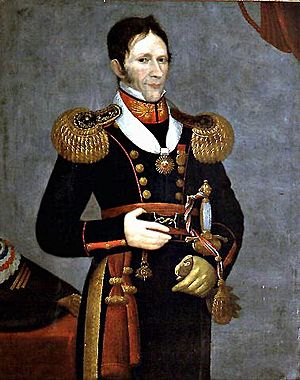José María de la Cruz facts for kids
Quick facts for kids
José María de la Cruz
|
|
|---|---|

Portrait by José Gil de Castro
|
|
| Navy General Commander | |
| In office 1842–1843 |
|
| Preceded by | Victorino Garrido |
| Succeeded by | Robert Simpson |
| In office 1829–1831 |
|
| Preceded by | Francisco de la Lastra |
| Succeeded by | José Matías López |
| Minister of War and Navy | |
| In office 1841–1842 |
|
| Preceded by | Manuel Montt |
| Succeeded by | José Santiago Aldunate |
| In office 1830–1831 |
|
| Preceded by | José María Benavente |
| Succeeded by | Diego Portales |
| Personal details | |
| Born | March 25, 1799 Concepción, Chile |
| Died | November 23, 1875 (aged 76) Concepción, Chile |
| Spouse | Josefa Zañartu Trujillo |
| Children | Delfina de la Cruz |
| Parents |
|
| Military service | |
| Allegiance | |
| Branch/service | |
| Rank | Divisional General |
| Battles/wars |
|
General José María de la Cruz Prieto (born March 25, 1799, in Concepción – died November 23, 1875, in Concepción) was an important Chilean soldier and political figure. He played a key role in several major events in Chile's early history.
José María was the son of Luis de la Cruz and Josefa Prieto Sotomayor. He was also a cousin to two future presidents of Chile: José Joaquín Prieto and Manuel Bulnes. He married Josefa Zañartu Trujillo, and they had one daughter, Delfina de la Cruz Zañartu. Delfina later married Aníbal Pinto, who also became a president of Chile.
Contents
Early Military Career
José María de la Cruz joined the Chilean Army on October 27, 1811. This was a very important time for Chile, as it was fighting for its freedom from Spain. He bravely took part in several major battles during the Chilean War of Independence.
These important battles included:
- The Battle of Chacabuco
- The Battle of Maipú
- The Battle of Pangal
His actions in these battles helped Chile gain its independence.
Role in the War of the Confederation
Later, José María de la Cruz served in the War of the Confederation. This war was fought between Chile and the Peru-Bolivian Confederation. He was the second-in-command of the Chilean army, working under General Manuel Bulnes, who was his cousin.
He played a special part in the Chilean victory at the Battle of Yungay. This battle was a major turning point in the war, leading to the end of the Peru-Bolivian Confederation.
Life After the War
After the War of the Confederation, José María de la Cruz continued to serve his country. He became the Intendant (a type of governor) of Valparaíso, an important port city. Later, he became the Intendant of his home city, Concepción.
Presidential Election of 1851
In 1851, José María de la Cruz decided to run for president of Chile. However, he lost the election to Manuel Montt. This defeat led to a major event in Chilean history.
The 1851 Revolution
Because he lost the election, José María de la Cruz led a revolt in the southern provinces of Chile. This event is known as the Revolution of 1851. His cousin, Manuel Bulnes, who was then the president, put down the rebellion. The conflict ended when a peace agreement, called the Treaty of Purapel, was signed between the government and the revolutionaries.
Later Years
After the 1851 revolution, José María de la Cruz decided to retire from politics and military life. He lived out his remaining years in Concepción, where he passed away at the age of 76. He is remembered as a significant figure in Chile's fight for independence and its early years as a republic.
| Political offices | ||
|---|---|---|
| Preceded by José María Benavente |
Minister of War and Navy 1830-1831 |
Succeeded by Diego Portales |
| Preceded by Manuel Montt |
Minister of War and Navy 1841-1842 |
Succeeded by José Santiago Aldunate |
| Military offices
|
||
| Preceded by Francisco de la Lastra |
Navy General Commander 1829-1831 |
Succeeded by José Matías López |
| Preceded by Victorino Garrido |
Navy General Commander 1842-1843 |
Succeeded by Robert Simpson |
See also
 In Spanish: José María de la Cruz Prieto para niños
In Spanish: José María de la Cruz Prieto para niños

